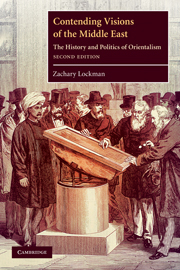Book contents
- Frontmatter
- Contents
- List of maps
- Acknowledgments
- Preface to the second edition
- Maps
- Introduction
- 1 In the beginning
- 2 Islam, the West and the rest
- 3 Orientalism and empire
- 4 The American century
- 5 Turmoil in the field
- 6 Said's Orientalism: a book and its aftermath
- 7 After Orientalism?
- Afterword
- Notes
- Bibliography
- Index
7 - After Orientalism?
Published online by Cambridge University Press: 05 June 2012
- Frontmatter
- Contents
- List of maps
- Acknowledgments
- Preface to the second edition
- Maps
- Introduction
- 1 In the beginning
- 2 Islam, the West and the rest
- 3 Orientalism and empire
- 4 The American century
- 5 Turmoil in the field
- 6 Said's Orientalism: a book and its aftermath
- 7 After Orientalism?
- Afterword
- Notes
- Bibliography
- Index
Summary
Not everyone accepted the critique of Orientalism, of course. A good many scholars of Islam or the Middle East rejected it outright and lamented the fact that “Orientalist” had come to be widely used in a pejorative sense. Others found the whole controversy largely irrelevant to their work, continued much as they had always done, or embraced different ways of making sense of things. These included non-Marxist variants of political economy, for example John Waterbury's 1983 book The Egypt of Nasser and Sadat: The Political Economy of Two Regimes or Alan Richards and John Waterbury's 1990 A Political Economy of the Middle East: State, Class, and Economic Development, but also one or another of the new games in town. For example, “rational choice theory” proliferated in American political science in this same period, sporting premises and methods that could not have been more incommensurate with those of colonial discourse analysis, postcolonial theory, poststructuralism, mainstream social science or even plain old Marxism – though perhaps it had somewhat less of an impact on political science work on the Middle East than it did elsewhere.
Nonetheless, the critique of Orientalism gradually won widespread (if never universal) acceptance among students of the Middle East and Islam, and the rejection of cultural essentialism and of the radical dichotomization of East and West which lay at its heart eventually came to be taken as plain common sense by many in the field.
- Type
- Chapter
- Information
- Contending Visions of the Middle EastThe History and Politics of Orientalism, pp. 216 - 273Publisher: Cambridge University PressPrint publication year: 2009

